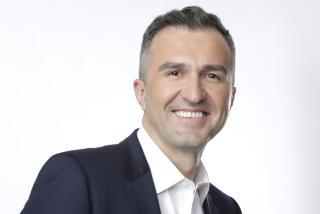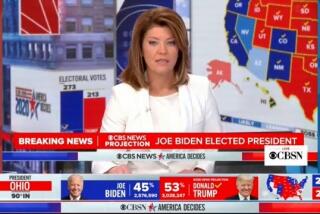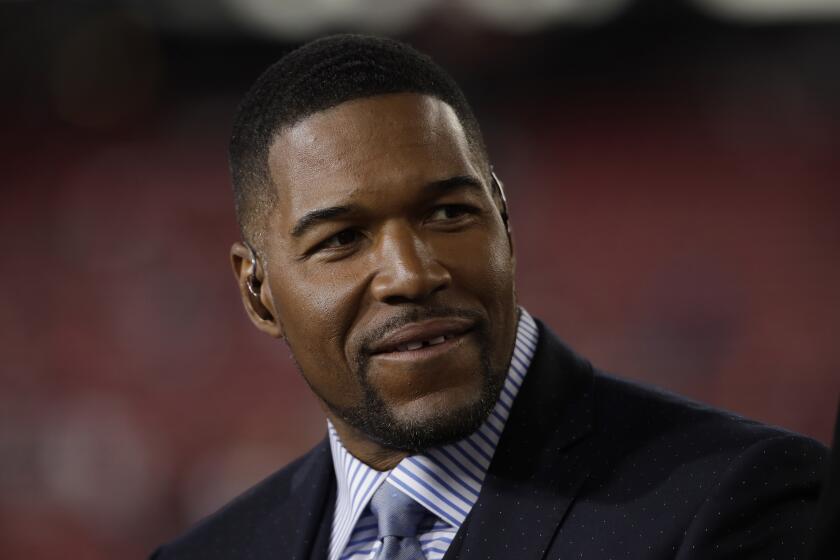Gregory gets his official ‘Press’ pass
“Meet the Press,” the predominant political forum on television, entered a new era Sunday as NBC announced that David Gregory will take the helm of the program, six months after the death of longtime moderator Tim Russert.
The selection of Gregory, NBC’s chief White House correspondent, was no surprise, having leaked out days ago after weeks of speculation.
Interim host Tom Brokaw confirmed the news at the end of Sunday’s show, introducing Gregory as a “great friend and cherished colleague.” The 38-year-old called the appointment “daunting and humbling” and briefly choked up on the air as he described the program’s “great purpose.”
“There’s a lot of pressure,” he said later. “I’m not Tim Russert, but I can, working with this team, try really hard to make him proud.”
The furious conjecture that preceded the announcement underscored the lasting potency of the program, the oldest on television. For six decades, “Meet the Press” has been a political mainstay, one of the preeminent platforms for elected officials and policymakers. John F. Kennedy called it “the 51st state.” Sweating while the boss squirms in the hot seat is a Sunday morning ritual for aides up and down Pennsylvania Avenue.
There’s no sign of that changing with a new administration. President-elect Barack Obama was Brokaw’s guest on Sunday, after a month in which his aides have cropped up regularly on all four Sunday morning network shows.
Together, the public-affairs programs occupy a rare niche in a landscape cluttered with glib political chatfests.
“It’s the most old-fashioned kind of journalism,” said Bob Schieffer, moderator of CBS’ “Face the Nation.” “It is the last place where people don’t scream and holler. There are no bells and whistles. We basically turn on the lights, sit down and ask the questions.”
Schieffer, who was close friends with Russert, called his successor “a very good choice.”
“He’ll be a tough competitor, and I intend to give him no break whatsoever,” he said.
Indeed, Gregory’s arrival could recharge the already pitched rivalry among the Sunday shows after 11 years in which “Meet the Press” has dominated the ratings.
Chris Wallace, host of “Fox News Sunday” and a former “Meet the Press” moderator, called Gregory “a very solid newsman” but noted that “he’s got big shoes to fill.”
“There’s going to be some shopping around,” he added. “That creates an opportunity for me and all the other competitors.”
George Stephanopoulos, host of ABC’s “This Week,” declined to say how the change could affect the fortunes of his second-place program but said the new NBC moderator is a “terrific broadcaster.”
Gregory comes to the job with substantial political bona fides, having covered three presidential campaigns and the Bush White House, where he was known for his pugnacious questions. But there’s no doubt that he faces a steep challenge in living up to the legacy of Russert, who served as moderator for nearly 17 years before dying from a heart attack in June. His zest for the job and prosecutorial style gave him a national profile.
“Tim left such a void there that there was no natural to step into that role,” said Garrick Utley, a former NBC anchor who preceded Russert in the post.
Network executives spent months mulling over candidates such as NBC chief foreign affairs correspondent Andrea Mitchell, NBC political director Chuck Todd, PBS anchor Gwen Ifill and CBS anchor Katie Couric.
But throughout the process, Gregory was the front-runner, said NBC News President Steve Capus, citing his reporting and interviewing chops.
“While we had any number of conversations that I would characterize as passing interest from other folks, I always knew David had the top spot and it was going take something extraordinary to bump him out of that position,” Capus said. Tapping someone within NBC was key, he added.
“We don’t have the luxury of ramping up and getting up to speed,” he said. “The country is in such deep turmoil on so many fronts that we thought it was important to be ready to go from Day One. This is the ultimate Washington insider’s job, and David has proven, day in and day out, that this is a job that was meant to be.”
Network executives had contemplated naming Todd or Mitchell as permanent panelists on the show’s round table, but Capus said he wanted to give the program flexibility to bring in different guests. “Why box yourselves in?” he said.
Gregory is giving up his daily afternoon show on MSNBC but will continue serving as a substitute anchor on the “Today” show. He’ll begin moderating “Meet the Press” next Sunday. Betsy Fischer, who is continuing as the program’s executive producer, said she thought the transition would be “seamless.”
The intense interest in who would succeed Russert belies the show’s viewership. Last month, the peak of the presidential campaign, “Meet the Press” drew an average audience of 4.49 million people -- a respectable number but a fraction of the audience of a hit prime-time series. Its rivals attract smaller numbers: “This Week” had 3.5 million viewers in November, “Face the Nation” pulled in 3.1 million and “Fox News Sunday” delivered 1.5 million.
But it’s who watches that counts: members of Congress, administration officials and the rest of Washington’s political class as well as political junkies around the country.
“Aside from the Redskins, it’s the only game in town in terms of what people talk about Monday morning,” said Washington Post columnist David S. Broder, who has been on “Meet the Press” more than 400 times, a record number.
Headlines from the programs are picked up by the rest of the media, spawning stories that set the week’s agenda. “Our proportion of news made to size of audience is pretty high,” Stephanopoulos said.
The programs are such a fabric of Washington that they shape the city’s rhythms. By midweek, political aides are jostling for air time for their bosses and strategizing about the best surrogates to make their cases. Avoiding the shows, as Alaska Gov. Sarah Palin did during this year’s presidential campaign, can be perilous for politicians with something to prove.
“There was a feeling that she hadn’t paid her dues or hadn’t gone through the full vetting process by refusing to do a Sunday show,” Wallace said.
In the current economic climate, the programs are more important than ever, Brokaw told Gregory on Sunday.
“We are in very, very difficult times, and people want to participate in their own destiny,” he said. “So it makes Sunday morning, across all these networks, and especially here on ‘Meet the Press,’ a critically important time in American life.”
The status of “Meet the Press” is in part because of Russert, who helped boost the show out of third place. He persuaded NBC to expand the program from 30 minutes to an hour and broadened the role of the moderator, who once simply presided over a panel of journalists.
Facing his grilling came to be regarded as a prerequisite for seeking the presidency, a rite known as the “Russert Primary.” His trademark approach of impeaching his guest with a remark or video clip from years past sent aides poring over their boss’ records to formulate responses before an appearance.
“You prepare twice as hard for ‘Meet the Press’ as for any other interview,” said Dan Schnur, a GOP strategist who worked on Sen. John McCain’s 2000 presidential bid.
Now Gregory faces the challenge of upholding the show’s reputation for rigor.
“The path is right in front of me in terms of what the model is and what the standards are,” he said. “I’m going to do what Tim taught me to do, which is you keep your head down and you work hard and you be prepared, and that’s what matters.”
--
faye.fiore@latimes.com
--
Matea Gold reporting from New York
Faye Fiore reporting from Washington
--
‘Meet the Press’
Where: NBC
When: 8 a.m Sundays
Rating: TV-G (suitable for all ages)
More to Read
The complete guide to home viewing
Get Screen Gab for everything about the TV shows and streaming movies everyone’s talking about.
You may occasionally receive promotional content from the Los Angeles Times.






